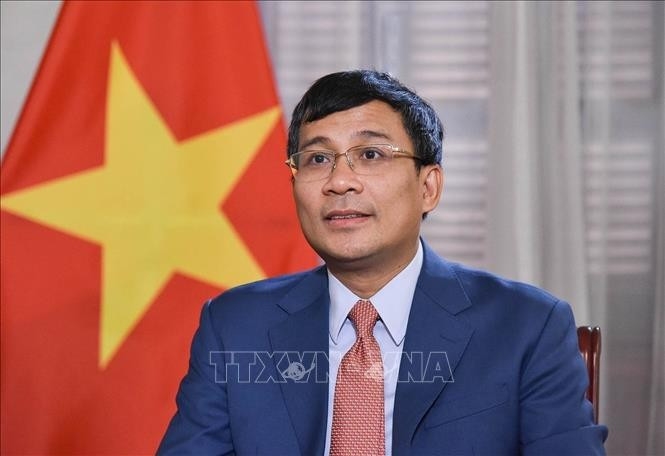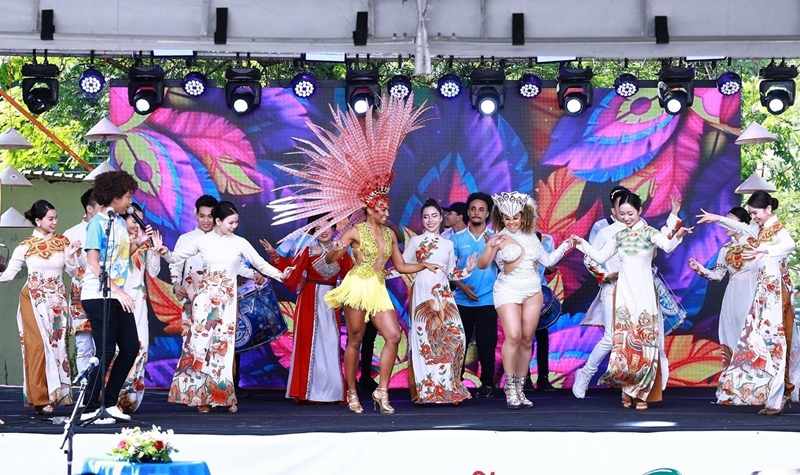Reporter: Vietnam adopted its Cultural Diplomacy Strategy to 2030. Could you please tell us how is cultural diplomacy being integrated with political and economic diplomacy?
Deputy Minister Nguyen Minh Vu: Since the launch of our renewal policy, the Party and State have identified cultural diplomacy as one of the three pillars of Vietnam’s comprehensive diplomacy, along with politic and economic diplomacy. These pillars are closely connected, with culture both laying the foundation and acting as a catalyst or political and economic engagement.
    |
 |
|
Permanent Deputy Minister of Foreign Affairs and Chairman of the Vietnam National Commission for UNESCO Nguyen Minh Vu |
Politically, cultural diplomacy has helped to create a favorable environment and enhanced Vietnam’s image and prestige on the global stage. President Ho Chi Minh’s thought and Vietnamese cultural icons such as Nguyen Trai, Nguyen Du, and Ho Xuan Huong were honored by the United Nations Educational, Scientific and Cultural Organization (UNESCO) for their contributions to the planet and wider society. Cultural elements are also woven into high-level visits, from the inauguration of the Memorial Room dedicated to President Ho Chi Minh in Azerbaijan to leaders’ visits to the Temple of Literature and the Imperial Citadel of Thang Long. These symbolic moments present Vietnam as a country of rich identity and reliability.
Vietnam’s growing role at UNESCO also illustrates this success. By contributing initiatives and holding important positions, we have built international trust while creating new channels for diplomatic engagement.
Economically, cultural diplomacy has promoted trade, investment, tourism, and the development of “heritage economy.” Large-scale events such as “Vietnam Days Abroad” combine art, cuisine, handicrafts, and business networking, creating strong appeal for international partners and new opportunities for localities and enterprises. UNESCO-recognized sites like Hoi An, Ninh Binh, Quang Ninh, and Hue have become drivers of green tourism and sustainable livelihoods. With 73 UNESCO titles, the highest in the Association of Southeast Asian Nations (ASEAN), Vietnam has turned heritage into both a cultural and economic asset.
In short, cultural diplomacy, intertwined with politic and economic diplomacy, is not just a task under the Cultural Diplomacy Strategy to 2030 but a long-term vision for a modern, comprehensive diplomacy that serves national interests and development.
Reporter: How do you assess the role of overseas Vietnamese in promoting Vietnam’s culture abroad?
Deputy Minister Nguyen Minh Vu: Nearly 6 million Vietnamese living in over 130 countries and territories across the world have served as "unofficial cultural ambassadors," and helped to preserve and spread Vietnamese cultural identity while integrating with local communities.
Wherever Vietnamese people settle, vibrant expressions of the Vietnamese culture flourish: language, customs, cuisine, and festivals like Lunar New Year and Mid-Autumn Festivals. These celebrations attract not only Vietnamese communities but also international friends, with dishes like pho, spring rolls, and banh mi transcending community boundaries to become cultural bridges.
What is remarkable is the way Vietnamese culture, through its warmth and authenticity, resonates with foreigners. Many international friends are not just admirers but active practitioners of Vietnamese culture as they study the language, practice Vovinam martial arts, cook Vietnamese dishes, or don the Ao dai. Some even celebrate Tet with Vietnamese families, while world-renowned chefs embrace Vietnamese cuisine as a creative inspiration. The love of culture knows no borders - once it touches people’s hearts, it transcends geography.
Promoting Vietnamese culture abroad is not about one-off events, but a long-term journey of the entire community. Overseas Vietnamese are living bridges and endless cultural currents carrying Vietnam’s identity further to the world, where it is increasingly recognized, embraced, and shared.
Reporter: In the era of the nation’s rise, could you please tell us what role should cultural diplomacy play?
Deputy Minister Nguyen Minh Vu: Vietnam is entering a new era – the era of the nation’s rise, aiming for prosperity and strength. In this context, the diplomatic sector in general and cultural diplomacy in particular must adapt with new mindsets and approaches, as set out in the Politburo’s Resolution No. 59-NQ/TW on international integration in the new situation.
First, cultural diplomacy must be closely connected with economic diplomacy to achieve our socio-economic development goals. With the set targets of 8% economic growth in 2025 and two-digit growth in the following years, and becoming a high-income developed nation by 2045, cultural diplomacy should promote national image, tourism potential, foreign investment attraction, and international trade connections while developing competitive cultural industries and heritage economy.
    |
 |
|
During his trip to attend the G20 Summit in Rio de Janeiro, Brazil, on the afternoon of November 17, 2024, Prime Minister Pham Minh Chinh and his spouse attend the “Vietnam Day in Brazil” program. |
Second, it should play an important role in promoting intensive and extensive international cultural integration while preserving national identity. Through the engagement of sectors, localities, enterprises, and citizens, Vietnam will become an attractive destination for international cultural events, leveraging famous media channels and influential figures to effectively showcase Vietnamese culture to diverse global audiences.
Third, cultural diplomacy helps improve Vietnam's position and prestige, and enhance the country's soft power and comprehensive national strength in the new era, building Vietnam as a peaceful, friendly, dynamic, and innovative nation that contributes positively to regional and global development.
As Party General Secretary To Lam emphasized, culture must be fully integrated into diplomacy, with every external activity becoming a cultural activity. Culture should be both means and principle, both method and objective, constantly elevating Vietnam’s soft power to new heights.
In short, in the new era of aspirations and integration, cultural diplomacy is not merely a choice but a strategic requirement and a historic mission that enables Vietnam to enter a new stage of development: economically prosperous, culturally rich, and firmly positioned on the international stage.
Reporter: Thank you very much!
Source: VNA